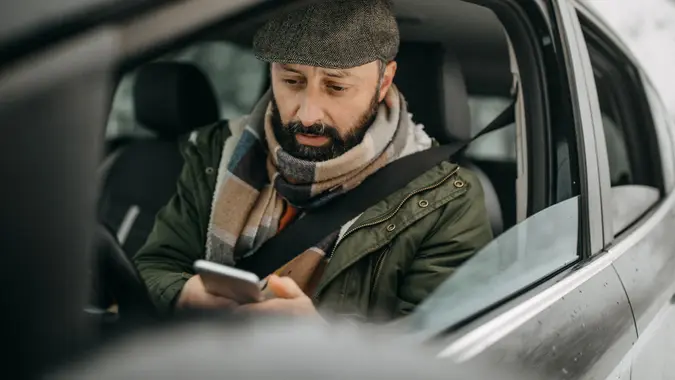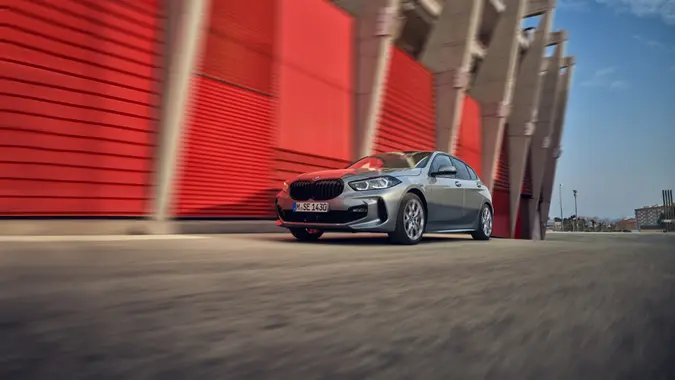Secured vs. Unsecured Auto Loans: What’s the Difference?

Commitment to Our Readers
GOBankingRates' editorial team is committed to bringing you unbiased reviews and information. We use data-driven methodologies to evaluate financial products and services - our reviews and ratings are not influenced by advertisers. You can read more about our editorial guidelines and our products and services review methodology.

20 Years
Helping You Live Richer

Reviewed
by Experts

Trusted by
Millions of Readers
Ever found yourself wondering, “Is an auto loan secured or unsecured?” You’re not alone. Many people get stuck on this question when they start shopping for a car.
With multiple financing options floating around, it can be tough to figure out which is best for your budget and peace of mind. The short answer? Most auto loans you see advertised are secured, but there are unsecured auto loans out there, too.
In this guide, we’ll walk you through everything you need to know about secured vs. unsecured auto loans. You’ll learn how each type works, what the benefits and drawbacks are and how to choose the right option for your financial situation.
Why Understanding Secured vs. Unsecured Auto Loans Matters
Buying a car is a major financial commitment. You want the best loan terms possible if you’re eyeing a brand-new SUV or a used sedan. Knowing the difference between a secured and an unsecured loan could save you money in the long run and help you avoid unnecessary stress.
Plus, understanding these basics makes you a more informed consumer, which can lead to better deals and less anxiety when you sign on the dotted line.
What Is a Secured Auto Loan?
A secured auto loan is one where the vehicle itself serves as collateral. Failing to make your monthly payments gives the lender the right to repossess your car. It might sound risky, but there are upsides.
- Lower Interest Rates: Because the lender has a safety net (the car), they often charge lower interest.
- Higher Approval Odds: If your credit score isn’t stellar, securing the loan with the car can boost your chances of getting approved.
- Larger Loan Amounts: Lenders tend to be more comfortable extending bigger loans when they have collateral.
How a Secured Auto Loan Works
In practice, most auto loans from banks, credit unions and dealerships are secured. The car’s title will be in the lender’s name until you finish paying off the loan.
If you make all your payments on time, you eventually gain full ownership. If you miss payments, the lender can repossess the vehicle to recover some of their losses.
What Is an Unsecured Auto Loan?
An unsecured auto loan, on the other hand, doesn’t use any collateral. Approval depends largely on your creditworthiness and income. If you default, the lender can’t repossess your car directly, but they can still take legal action to recover the debt, like suing or sending your account to collections.
- No Collateral Required: You’re not putting your car on the line.
- Potentially Faster Application: With strong credit, approval can be quick.
- Higher Interest Rates: Because lenders take on more risk, they usually charge a higher APR.
How an Unsecured Auto Loan Works
These loans are often structured like personal loans you can use to buy a car. You apply based on your financial history, credit score and income level. If approved, you’ll receive funds to purchase the vehicle outright.
Because there’s no collateral, your credit profile needs to be strong to secure favorable terms — unsecured auto loans can be pricey for those with less-than-perfect credit.
Secured vs. Unsecured Auto Loans: Key Differences
How are secured and unsecured auto loans different from one another? Here’s a table comparing the two auto loans:
| Feature | Secured Auto Loan | Unsecured Auto Loan |
|---|---|---|
| Collateral Required | Yes, the car serves as collateral | No collateral required |
| Interest Rates | Lower due to reduced lender risk | Higher due to increased lender risk |
| Approval Process | Based on credit and vehicle value | Based primarily on credit score |
| Loan Amount | Typically covers the car’s full value | May be less than the car’s total cost |
| Risk to Borrower | Possible repossession if you default | No direct risk of losing the vehicle |
Key Takeaway: Most traditional auto loans are secured, meaning the lender holds a stake in your vehicle. Unsecured auto loans don’t require collateral, but the interest rates and credit requirements are usually stricter.
Pros and Cons of Secured and Unsecured Auto Loans
Curious about the pros and cons of secured and unsecured auto loans? Weigh these advantages and disadvantages before deciding.
Pros of Secured Auto Loans:
- Lower interest rates: Since your vehicle is the loan’s collateral, you’ll likely pay lower interest rates.
- Higher loan amounts: Because you’re financing the vehicle using it as collateral, you can get a higher loan amount.
- Easier approval: Borrowers with average credit will get easier loan approvals.
Cons of Secured Auto Loans:
- Risk of repossession: If you fail to make loan payments, the lender will repossess your vehicle.
- Down payment required: Not only are you required to make monthly payments, but you’ll likely be asked to make a down payment.
Pros of Unsecured Auto Loans:
- No risk of repo: Since there’s no car securing the loan, the lender can’t repossess your vehicle if you default.
- More choices in vehicles: You have a wide selection of vehicles since you can also consider private sales with an unsecured loan.
Cons of Unsecured Auto Loans:
- Higher interest rates: Unsecured auto loans have higher interest rates because the loans are riskier for lenders.
- Stricter requirements: Unsecured loans have stricter credit and income requirements.
- Lower borrowing limits: Unsecured loans may have lower borrowing limits.
Is an Auto Loan Secured or Unsecured? Real-World Examples
- Example 1: Buying a car through a dealership – If you apply for financing on-site, you’ll likely get a secured auto loan. The dealership works with partner banks or has its own finance arm, and they’ll use your new car as collateral.
- Example 2: Using a personal loan for a used car – If you skip dealer financing and apply for a loan at your local bank without naming the car as collateral, that’s probably an unsecured loan. You’ll pay off the seller in cash and repay the bank as you would any personal loan.
When Should You Choose a Secured vs. Unsecured Auto Loan?
Here’s a comparison chart showing when each loan type is the better option:
| Loan Type | Best For |
|---|---|
| Secured Loan | Want lower interest rates Have a lower credit score Need full financing for your car purchase |
| Unsecured Loan | Have excellent credit and qualify for competitive rates Don’t want to risk losing your car as collateral Are buying from a private seller and need flexible terms |
How to Apply for a Secured or Unsecured Auto Loan
Curious about how to apply for a secured or unsecured auto loan? Use this guide for a step-by-step process:
Step 1. Check your credit scores – The higher your credit score, the more likely you’ll receive better interest rates.
Step 2. Compare lenders – It’s a good idea to compare your options at banks, credit unions and online lenders. Online lenders may offer promos, and if you’re a member of a credit union, you may receive a discounted rate.
Step 3. Choose a loan type – Depending on your financial situation, decide between a secured or unsecured loan.
Step 4. Gather required documents – Make sure you have the required documents. This could include proof of income and ID.
Step 5. Apply and review loan terms – After you apply and your loan is approved, check interest rates, repayment terms and any fees.
Final Thoughts to GO
When you’re trying to finance your car, a secured loan is the most common way to do so. A secured loan offers better interest rates and will likely fund your entire car amount. A secured loan uses your vehicle as collateral. Although secured loans are the most well-known option, unsecured loans can help those with strong credit. These loans don’t require the car as collateral.
Your decision to choose either a secure or unsecured loan depends on your financial goals and creditworthiness.
FAQs
Here are some common questions and concerns to keep in mind when it comes to unsecured auto loans:- Is an auto loan secured or unsecured by default?
- Most auto loans are secured. Lenders typically use the car as collateral for better repayment security. However, unsecured options exist for borrowers with strong credit and a higher tolerance for interest rates.
- What happens if I default on a secured auto loan?
- Your lender may repossess the car and sell it to recoup losses. You’d still be responsible for any unpaid balance if the sale doesn’t cover your debt.
- Are unsecured auto loans harder to get?
- Generally, yes. You need a solid credit score and reliable income. Lenders also tend to offer smaller loan amounts at higher rates because there’s no collateral.
- Can I switch from a secured to an unsecured loan later?
- Refinancing is possible, but it’s not common to go from a secured to an unsecured product. Most refinances remain secured unless you opt for a personal loan refinance.
- What credit score is needed for an unsecured auto loan?
- Requirements vary, but you’ll usually need a score in the good to excellent range (around 670 or higher) to land a decent interest rate.
- How do I know if my auto loan is secured or unsecured?
- Check your loan documents. If the terms mention using the vehicle as collateral or outline repossession procedures, it’s secured.
The information is accurate as of April 10, 2025.
Editorial Note: This content is not provided by any entity covered in this article. Any opinions, analyses, reviews, ratings or recommendations expressed in this article are those of the author alone and have not been reviewed, approved or otherwise endorsed by any entity named in this article.
Our in-house research team and on-site financial experts work together to create content that’s accurate, impartial, and up to date. We fact-check every single statistic, quote and fact using trusted primary resources to make sure the information we provide is correct. You can learn more about GOBankingRates’ processes and standards in our editorial policy.
- CFPB "Differentiating between secured and unsecured loans"
- MyCreditUnion.gov "Types of Loans"
- Federal Reserve "Selected Interest Rates (Daily)"
- FTC "Free Credit Reports"
- FTC "Vehicle Repossession"
 Written by
Written by  Edited by
Edited by 

























